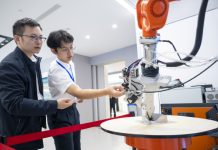ISLAMABAD: Pakistan needs to develop human capital to capitalize on significant job opportunities under the China-Pakistan Economic Corridor (CPEC), reports WealthPK.
CPEC is expected to provide significant job opportunities for the domestic labor force, particularly after the proposed Special Economic Zones (SEZs) are established. Pakistan, with a young population of 60% below the age of 30, is in an advantageous position to capitalize on these opportunities.
Therefore, Pakistan must concentrate on raising the quality of human capital in order to ensure that both the present and coming labor forces are qualified to meet the expanding technical demands of the changing nature of work.
According to the CPEC Authority, it has been estimated that total investment in the four SEZs named Rashakai, Allama Iqbal Zone, Dhabeji, and Bostan is $10.3 billion. This investment will create at least 420,000 jobs, according to government estimates.
To maximize returns from the opportunities arising out of implementation of CPEC SEZs, Pakistan would have to take serious notice of its human capital deficiency. The government needs to devise a framework focusing on skill-development of the workforce and adequate provision of associated services in order to stand on an equal footing with the rest of the regional economies.
It should be mentioned here that Pakistan is ranked 134th out of 157 countries on the Human Capital Index (HCI). Almost two decades ago, the National Commission for Human Development (NCHD) was founded in July 2002, but Pakistan is still far behind as compared to other countries.
Many present employments have been reinterpreted and new kinds of labor have emerged as a result of integration of digital technology. As a result, investing in human capital that is aligned with digital transformation might be a significant priority for Pakistan. In this regard, new human resource development policy frameworks concentrating on fair education, life skills, and vocational training are anticipated to follow.
Job creation is linked with development projects and economic development. So, if the youth are provided with technical training in different fields, they can compete in international markets and contribute to the economic development of their own country. More attention should be given to advanced technology, training, and skill development of human capital.
The government should focus on improving technology and efficiency and increasing job opportunities for the country’s growing population. By doing this, the growing population will improve economic growth rather than become an impediment. The government is also focusing on increasing the enrolment ratio at all education levels.
The government plans to train more than 100,000 young students in various fields like artificial intelligence, big data, and others. In this regard, the Higher Education Commission of Pakistan has extensively engaged with industry to ensure that the Pakistani graduates acquire an education that is relevant to the industrial needs developed by the CPEC.





